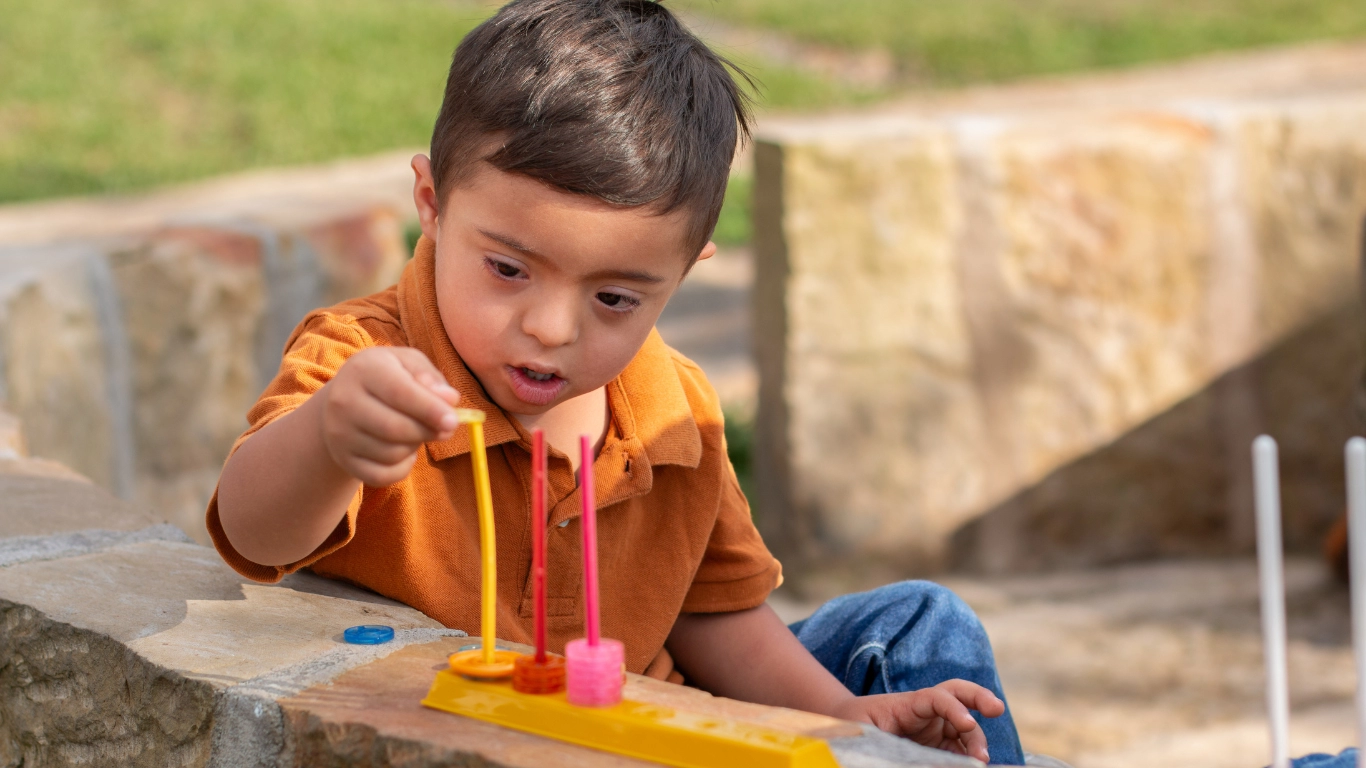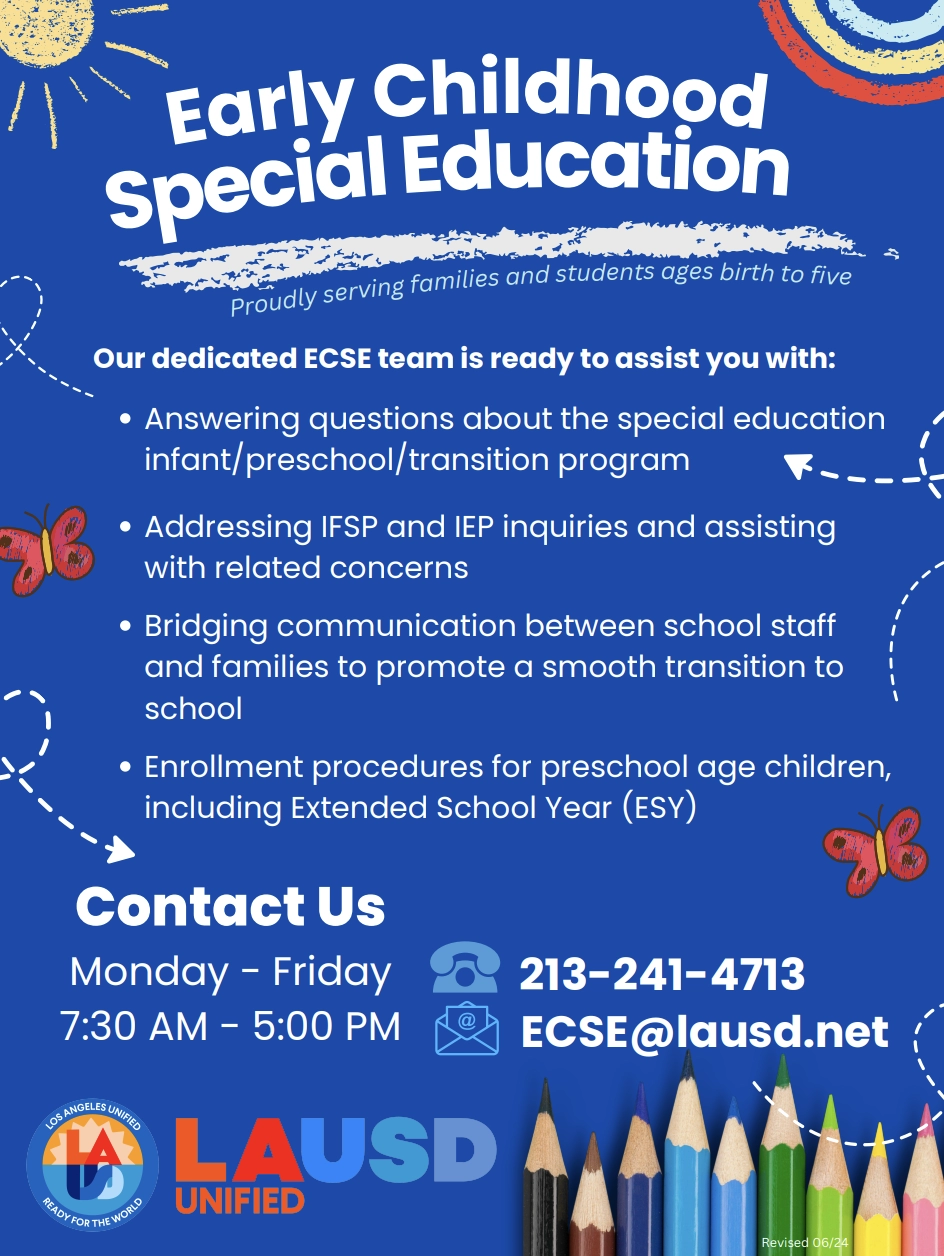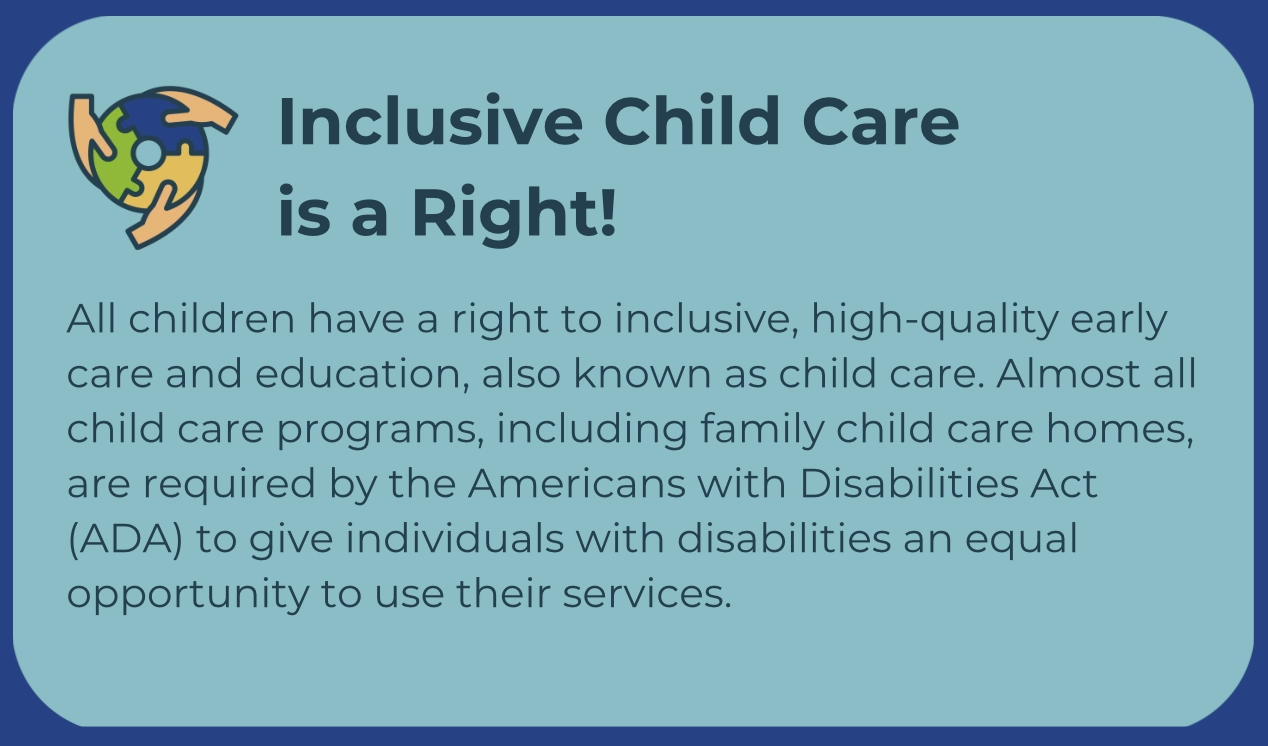
Children with disabilities and delays may have different needs. Early identification and intervention equip children and families with support for emerging developmental needs and improve long-term outcomes.
On this page, families can learn about identifying developmental delays and disabilities in their young children and get connected to supports like Early Start and child care.
Early Identification
Early identification of developmental disabilities and delays is critical in the early years of life, when a baby’s brain is rapidly developing. Early intervention can change a child’s developmental path and proactively equip families with the tools to support their children’s unique needs.

Developmental monitoring, developmental screening, and developmental evaluation all help to identify when a child needs extra support.
- What is developmental monitoring?
Developmental monitoring is the observing of a child’s growth to see if they are meeting the developmental milestones appropriate to their age. Parents, child care providers, and other caregivers can all take part in developmental monitoring.
- What is developmental screening?
Developmental screening is conducted through a formal developmental screening tool, like a test or a questionnaire. It can be done by a healthcare professional, like a doctor, or other professionals including trained child care providers. Developmental screening is often administered when the family or doctor has a concern; however, it is also a regular part of monitoring all children’s healthy development. EasterSeals, a nonprofit that supports people with disabilities, also offers parents free access to the Ages & Stages Questionnaires®, Third Edition™ (ASQ-3), a commonly used developmental screening tool for children from 1 month to 5 years of age. Learn more and take the test on the EasterSeals webpage.
- What is developmental evaluation?
If developmental screening flags a concern, a formal developmental evaluation may be done by a trained specialist like a developmental pediatrician to assess your child’s status and needs.
The CDC hosts a website that helps families track key milestones in their child’s development and learn more about developmental screening. Visit their page for families for targeted resources and links to support your child’s progress. You can also find more tips on supporting children’s development through every stage of life on CDC’s Positive Parenting Tips page.

Early Start is a program for infants and toddlers with developmental delays or who are at risk of developmental disabilities. Families with children up to 36 months of age can access a wide range of free special services through Early Start. Children receiving Early Start services will have an Individual Family Service Plan (IFSP) developed for them that plans the services and supports to best meet their needs. Check out the Early Start information packet in English or Spanish to learn more about accessing and navigating services.
To get connected to Early Start, families can contact their local regional center. Regional centers are publicly funded, community-based organizations that connect Californians with developmental disabilities to services and supports including child care. Anyone can contact a regional center; a referral from a doctor is not needed. Locate your local regional center on the Department of Developmental Services’s regional center lookup tool, or call 1-800-515-BABY to get the phone number of a local regional center.

In addition to regional centers, the below agencies can also connect families to support and services.
- Family Resource Centers
Family Resource Centers work together with regional centers and education agencies to connect children with disabilities and special needs to early intervention services. Their multilingual services include information and referral, help navigating the Early Start system, and parent-to-parent support. Families can find their local Family Resource Center on the Family Resource Centers Network of California website. They can also call 1-800-515-BABY to get the phone number of a local Family Resource Center.
- Family Empowerment Centers
Family Empowerment Centers are nonprofit organizations that provide training, peer support, referral services, and information to families of children and young adults with disabilities. Family Empowerment Centers also support families through the IEP process. Find a local FEC using the Seeds of Partnership directory, or call (916) 228-2388 for assistance.
- Help Me Grow LA
Help Me Grow LA is here to connect LA County families to developmental services and supports. Visit their website to access information on developmental milestones, developmental screenings, and finding supportive programs. To contact Help Me Grow LA, complete the online form or call (833) 903-3972.
- City of Los Angeles, Department on Disability
For families in the City of Los Angeles, the Department on Disability is also available to refer individuals and their families and caregivers to supportive services and agencies like regional centers. Contact the Department on Disability at DOD.Contact@lacity.org or (213) 202-2764.
Support for Children Above Age 3

A child who is 3 years of age and older will receive special services and an Individualized Education Plan (IEP) at no cost through their school district. An IEP is a written document that describes a student’s performance, goals, and needed services and helps children receive an education that is tailored to their needs.
For children up to age 5 who live within the boundaries of LA Unified School District (LAUSD), these special services are provided through LAUSD’s Early Childhood Special Education (ECSE) department. A child is eligible to receive special education services if the IEP team determines that they have a disability and need these services for their education. Children receiving services through ECSE can still use child care from outside LAUSD.
Referrals to ECSE may be made by parents, physicians or community agencies with parental consent. If your child is already receiving services through Early Start, a regional center service coordinator will refer your child to ECSE a few months before your child’s third birthday.
For more information, find ECSE on the ECSE website, by calling (213) 241-4713 from Monday to Friday, 7:30am-5pm, or by emailing ECSE@lausd.net.
The following resources also provide guidance on the transition and IEP Process:
- California Department of Developmental Services, Early Start Information Packet: Jump to page 26 to read more about how children transition from Early Start to Special Education at age 3.
- Team of Advocates for Special Kids (TASK): Funded by the U.S. Department of Education, TASK is a nonprofit Parent Training and Information Center (PTI) for six Southern California counties including LA County. TASK helps families understand the special education and IEP process and serves people with disabilities from birth to age 26.
Finding Inclusive Child Care

Child care providers can also be important partners in developing and implementing a child’s IFSP or IEP. Providers should be aware of the goals and components of the plan to help support your child’s development while in their care, including by consulting the IFSP or IEP for guidance on needed accommodations.

Need Help Finding Care?
Child Care Resource & Referral Agencies (R&Rs), community agencies that connect families to child care, may be able to help families find child care programs that are experienced in caring for children with disabilities and delays. To get in touch with the R&R for a particular zip code, families can use the Child Care Alliance of Los Angeles search tool. Family Resource Centers and regional centers can also help connect your child to needed services.
The California Department of Social Services, which licenses child care programs in the State of California, has a page with further guidance for parents and guardians looking for child care for children with disabilities. Families can also visit the Child Care Law Center’s page on child care for kids with disabilities, which includes articles on your child’s rights, administering medication, and legal information to give providers.

- Supplemental Security Income (SSI) for Children
Supplemental Security Income provides qualifying families with monthly cash payments for children up to the age of 18 with disabilities. (Infographic)
- Medicaid (Medi-Cal)
Medicaid is a federal and state program that provides health coverage for populations including low-income adults, children, and people with disabilities. In California, Medicaid is called Medi-Cal. Individuals who do not qualify for Medi-Cal may qualify for a Medi-Cal Waiver, which provides assistance for services and resources including medical treatment, medical equipment, and respite care.
- Children’s Health Insurance Program (CHIP)
Children’s Health Insurance Program provides health coverage for uninsured children up to age 19, including children with disabilities, from working families who make too much money to qualify for Medi-Cal. CHIP provides insurance for prescription drugs and vision, hearing, and mental health coverage.
- CalABLE
CalABLE allows people to save up to $100,000 for disability-related expenses without losing their eligibility for public benefits programs like SSI and Medi-Cal. This program is open to individuals with disabilities that occurred before age 26 who meet program criteria.
- In-Home Supportive Services (IHSS)
- Through the In-Home Supportive Services (IHSS) program, families can get in-home assistance for blind and disabled individuals instead of using out-of-home care. In-home assistance can be provided by someone you hire or, depending on the IHSS sub-programs, parents can be their minor child’s IHSS provider. Qualifications for IHSS include income restrictions and having a Medi-Cal eligibility determination. Explore the California Department for Social Services’s page on IHSS for children and find out how to apply for IHSS on LA County’s website.
- California Children’s Services (CCS)
California Children’s Services is a State program that provides or pays for diagnostic and treatment services like doctor visits for eligible children under age 21 with certain medical conditions. Learn more about CCS on the Department of Health Care Services website and find out how to apply on LA County’s CCS website.
- CalFresh
Formerly known as Food Stamps, the federal Supplemental Nutrition Assistance Program (SNAP) gives low-income families funds to purchase food. California’s SNAP program is called CalFresh and provides benefits through Electronic Benefit Transfer (EBT) cards, which are similar to debit cards. CalFresh has special eligibility allowances for households with disabled individuals. Learn more on the LA County Department of Public Social Services CalFresh webpage.
Key Terms
- Developmental delay
Occurs when a child is slow to achieve, or does not achieve, developmental milestones for their age group. Developmental delays are common and occur in as many as 1 in 6 children. Early Start, California’s early intervention program, can help a child catch up.
- Developmental disability
In California, a condition that occurs before the age of 18 years that is a substantial impairment in three or more areas of major life activity, and includes intellectual disability, autism, epilepsy, cerebral palsy, and conditions that require services similar to those required for intellectual disability. Early Start, California’s early intervention program, can help young children with developmental disabilities learn skills that usually form during a child’s early years.
- Disability
A condition, including physical or mental disabilities and medical conditions such as cancer and HIV/AIDS, that limits one or more major life activities.
- Early intervention
Support for young children with developmental delays and disabilities and their families.
- Inclusive care
Group care settings that actively include children with disabilities or delays with accommodations and supports.
- Individualized Education Plan (IEP)
A written plan for children ages 3 years and older outlining the educational plan for a child with delays or disabilities.
- Individualized family service plan (IFSP)
A family-focused written plan for providing early intervention services to infants and toddlers (birth to 36 months). It is developed by a service coordinator and the family, and includes the child’s current level of functioning and need as well as details about the services to be provided.






